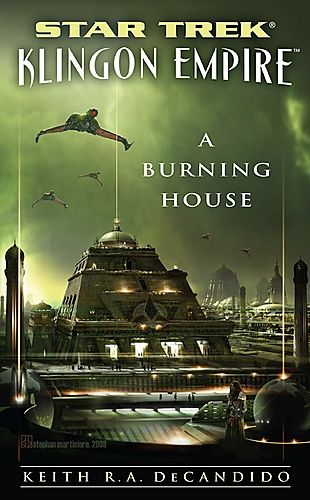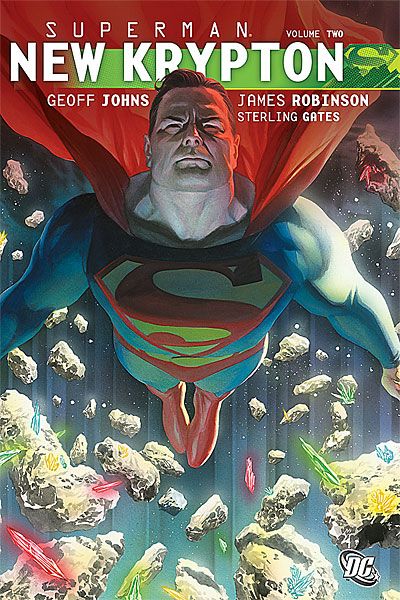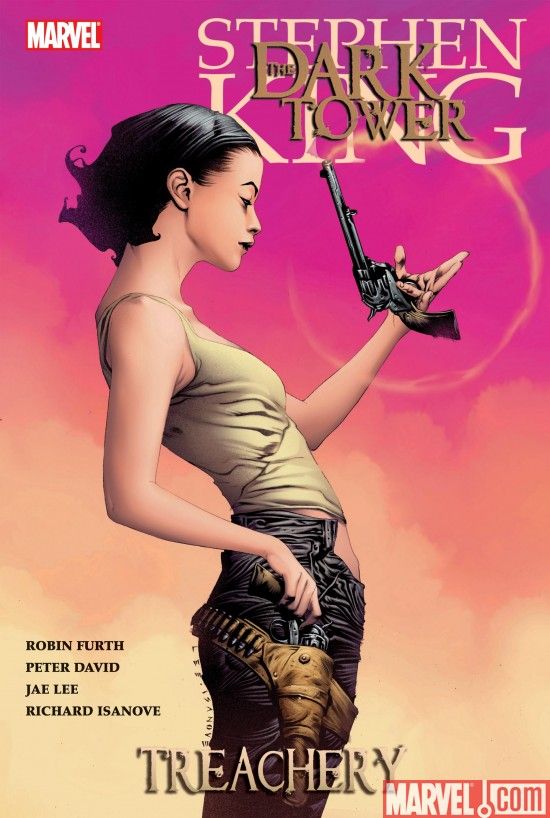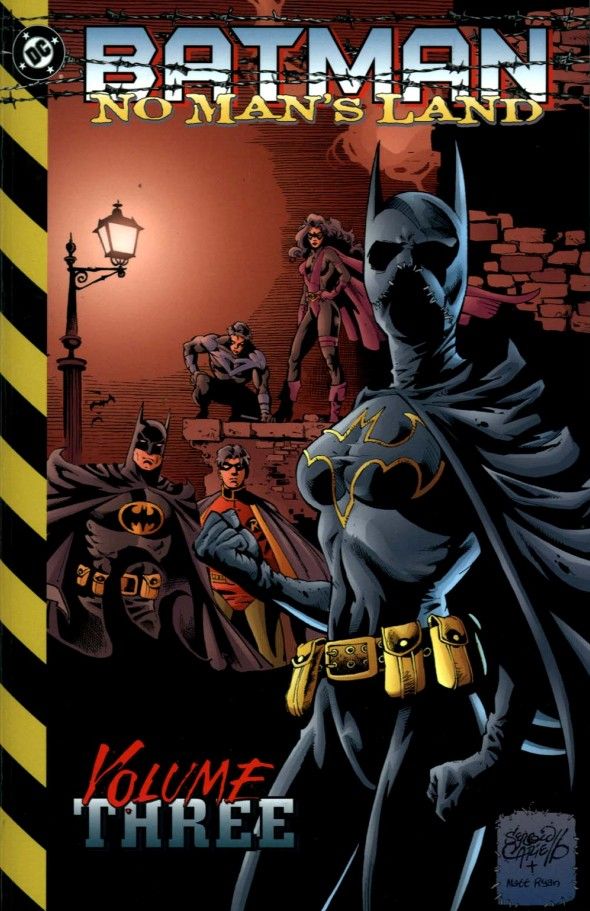Okay, so here is where I admit to being stupid. Or maybe it's just naive.
A couple of years ago, as we comics columnist types love to do, I was playing around with ideas for what the comics market might look like in the future. One of the thoughts I had then was the notion that mainstream superhero comics could quit trying to be monthly periodicals and just take the plunge into book publishing, along the same model as licensed paperbacks do. In other words, you'd keep the good things about a shared universe, but you could get rid of a lot of pacing and format problems. Problems that only exist because we are habituated to getting superhero comics as monthly booklets of a uniform size and page count, despite the fact that the spinner racks the format was specifically designed to accommodate no longer exist.
My idea was, you know, if the stories are being written for the trade paperback format anyway, what's the point of holding creators to the artificially rigid, clumsy format of a strict 22-page-per-chapter, six-chapter formula? Why not let creators pace things how they want to? Just put out the trade paperbacks to start with and be done with it.
There are good arguments on both sides of this -- on the pro side, you could give creators lots of lead time, you could have a variety of talent working on a character, you're not shackled to a specific format size, shape, or page count. Con, you have to get over the problem that trade collections only work financially if the monthly comics serve as loss leaders up front, comics retailers wouldn't be able to adapt, etc., etc.
I still like the idea. But one of the arguments that was brought up when I floated the notion a couple of years back was, "Companies would still do strictly continuity-driven serials, they'd just drag them out to fit the new trade-paperback format."
I snorted that this was ridiculous, fans would never stand for that kind of super-sprawl, no one would support an idea that stupid.
I stand corrected.
So this week, the third issue of Superman: Last Stand of New Krypton came out. That was allegedly the conclusion to a nine-part crossover story running through all the Super books the last couple of months. That spun out of the conclusion to the twelve-part World of New Krypton maxi-series, which in turn was launched from the six-part "Brainiac" arc that ran through the summer of 2008. And "Last Stand of New Krypton" didn't end either, it turns out that it's just the prelude to War of the Supermen.
Still with me? That means that means that the last time we actually had a Superman story conclude -- and by that I mean finish, no cliffhanger, no shocking last-panel twist, simply get to THE END -- was the Toyman story that preceded the Brainiac six-part arc. That was in May of 2008.
Two years ago.
Since that time, DC has released -- first in hardcover, priced at $24.99, and then in trade paperback for $17.99 -- Superman: Brainiac, Superman: Mon-El, Superman: New Krypton volumes one, two, and three... and none of these stories finish. There is no conclusion. Nor does there appear to be one on the horizon any time soon. These trade paperbacks collect "arcs" that don't really significantly arc. The numbering means nothing. These books don't end, they just stop.
Now, if it was just the Superman books, I'd shrug it off. But it's happening all over the place, at both Marvel and DC. At Marvel we have Civil War which led to The Initiative which became Dark Reign that led to Siege. DC had Omac Project and Villains United and Rann-Thanagar War -- all miniseries that were collected in trade paperback, none of which had an ending, but instead all led in to Infinite Crisis. And so on. More recently there was all the Green Lantern stuff that sprawled on from Sinestro Corps War through the rainbow of six-part colored-Lantern stories that culminated in Blackest Night, which it turns out was the prelude to Brightest Day.
So, okay, it's event fatigue.
Except it's not confined to event books any more. It really jumped out at me when I took an interest in the current run of Black Panther, as I mentioned last week. I've been reading the series in trade, and I was a little annoyed when I realized that of the six trade paperback collections that arrived over the last couple of weeks, only two of them actually concluded. The others ended in cliffhangers... "to be continued." I thought, if it annoys me when I'm getting these books heavily-discounted, used, and more or less in a bunch, how much more maddening would it be for readers who paid full price in good faith, thinking that they'd get a complete reading experience and not just a fragment of one?
This phenomenon has been creeping up on us for a while, but it startled me to realize that it had become the norm. Captain America, The Dark Tower, Immortal Iron Fist, JSA, Invincible Iron Man.... all series I've been reading in collected editions -- many of which only collect partial bits of a story.
And those are the books that aren't particularly known for soap-opera sprawl. God knows what the poor X-Men fans are going through.
There's a truism in psychology. It goes something like this -- the more a subject is aware of being manipulated, the less successful the manipulation becomes.
Or, as we used to grumble after the fourth season or so of The X-Files, "Okay, enough is enough, now you guys are just milking it."
I suspect that this habit of stretching stories out to an interminable length and spinning every plot point off into its own separate mini-series is born of desperation. DC and Marvel are hemorrhaging readers and editors are flailing around for any gimmick they can think of to keep any more of us from jumping ship. And these companies are in the business of selling books, after all; if they can sell more books on a tie-in mini-series gimmick, they will beat that gimmick into the ground. I get it. I do.
Let me clarify one point. I don't object to long-form stories, not at all. I love 24 the television show and I quite liked both 52 and Trinity. I was fine with Batman: No Man's Land.
But all those comics examples A) said right up front it was a year-long commitment, and B) kept that commitment honestly. After the year (or whatever) was up, they were done. That's fine with me and I've liked a lot of those efforts.
What I object to is this thing (like this week's really egregious example in the Superman books, but there are LOTS of others) where you get the ostensible finite commitment but then it turns out that, whoops, it's actually continuing on and the "ending" isn't really an ending at all. It's given us a bunch of trade collections that are not satisfying as entertainment, it's incredibly poorly-constructed as storytelling, and it has the added bonus of being false advertising.
How something this irritating on that many levels got to be almost the industry standard baffles me.
Look. At some point, even when you are trying something really long-form like 52 or Seven Soldiers or whatever, if you are doing it properly then you have to pay it off. People stick with a long-term story like Fringe or Lost or The X-Files on the premise that it's all leading up to something. And if you promise that your series is in six parts or twelve parts or even fifty-two parts then, goddammit, the audience has a right to expect that the last part ends with The End. Not "The story continues in...."
That kind of bait-and-switch won't get you new readers, and it doesn't even keep your loyal readers loyal. That just pisses them off. Eventually they'll get wise to the trick and leave.
If that kind of angry exodus happens often enough, then it really will be The End. And not the good kind.
At least, that's my guess. But as I said in the beginning, I might be really naive. God knows, I've underestimated the amount of crap the superhero audience will put up with before.
But sooner or later the bubble's gotta pop, doesn't it?
See you next week.





